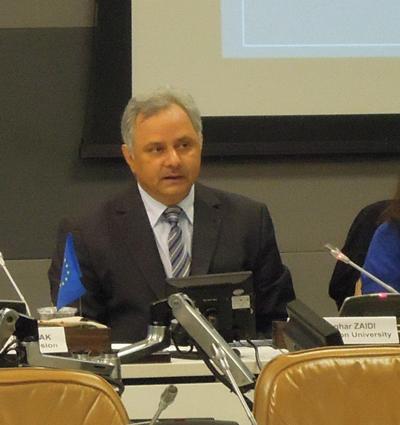Global AgeWatch Index takes centre stage at the United Nations

University of Southampton Professor Asghar Zaidi returns to United Nations Headquarters in New York this week as a lead speaker during the 52nd Session of the Commission for Social Development.
The goal of the CSocD is to advise the UN’s Economic and Social Council and Governments on a range of social policy issues from a development perspective.
Zaidi is Professor of International Policy in the University’s Centre for Research on Ageing and an associate of the ESRC Centre for Population Change. His participation in the CSocD is driven by his continued support towards ensuring that the UN’s post-2015 sustainable development agenda ’leave no one behind’ is inclusive, especially for the world’s ageing population. The data revolution that is required in support of the newly developed sustainable development goals demands better quality and additional age-disaggregated data and its analysis.
Over two side events, Professor Zaidi - the main architect behind the world’s first Global AgeWatch Index - joined representatives from Member States, UN agencies and civil society to present and discuss how the Index can be used as an innovative tool to profile global ageing and promote policies on well-being and quality of life of older people in a world of rising life expectancy.
Published in October 2013 by HelpAge International, the Index highlights the connection between social policy and the wellbeing of older people, as well as the huge gaps in our knowledge and international data sets which routinely exclude measuring levels of poverty, abuse, HIV prevalence and many others in people over the age of 49.
“The UN is embarking on a new post-2015 development agenda and the Commission for Social Development 2014 is an important forum to present and discuss our current work and potential developments and ensure that older people and issues of ageing and life course are fully included in the post-2015 sustainable development goals,” said Professor Zaidi.
In August last year, Professor Zaidi joined a panel of experts as part of a European Delegation at the UN to highlight the importance of empowerment, engagement and activation of older people as a response to ageing societies. He previewed then the Active Ageing Index, which he developed working with the European Commission and the UN-Economic omission for Europe, in an event which focused on ‘Mobilising the potential of older persons to create societies for all ages’.
“The compilation of statistical evidence in the form of composite indices, such as the EU’s active ageing index and Global AgeWatch Index of HelpAge International, will be essential in monitoring the new global development framework and also holding governments accountable," he concluded